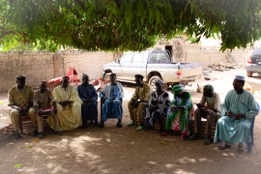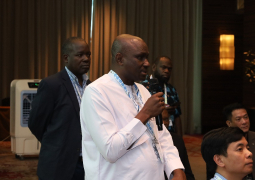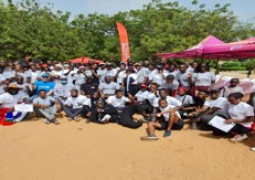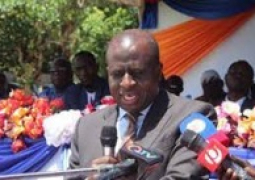
The training program which is the second phase was implemented in Sandu, Sami, Naini and Upper Fulladu West Districts involving the district chiefs, their tribunal members. Youth and women representatives attended and benefited from the training.
The intervention by the NCCE and FIOHTG was meant to enhance the knowledge and skills of tribunal members on gender sensitivity and equality as well as fair dispensation of justice at district level. The training also aimed to improve the capacity of tribunals to help identify, handle and address cases involving human rights issues effectively and fairly.
Speaking at the training venues in Sandu and Sami, Ansumana Ceesay, the Senior Program Officer of the NCCE reminded the gatherings that district tribunals play a vital role in the administration of justice at the local level in The Gambia.
He emphasised that they are a crucial component of the local justice system, responsible for resolving disputes at the community level, adding that tribunals often deal with matters such as land disputes, family issues (including sexual and gender based violence), inheritance matters, human rights and minor criminal offences.
"Their role is pivotal in ensuring justice is accessible and affordable at the grassroots level. Despite significant strides made by tribunals in promoting justice and equality, gaps remain in the ability of the traditional justice system to adequately protect citizens' and women's rights," Mr. Ceesay stated.
Also speaking at the training, Samsideen Ceesay, communication officer for Future In Our Hands The Gambia (FIOHTG), said many tribunal members lack formal legal training; therefore, they need such capacity to enhance their decision-making processes especially the representation of women in the tribunals.
He noted that these gaps are particularly pronounced at the district tribunal level, where members often lack the necessary training and resources to dispense justice fairly and equitably and this undermines the credibility of the justice system and leads to a lack of trust among some community members.
Therefore, he said the program with subsequent ones aims at enhancing the capacity of district tribunal members affiliated to FIOHTG’s intervention areas to dispense justice fairly, with an emphasis on safeguarding citizens' and women's rights.
Reacting to the importance and appropriateness of the training, Chief Pierre Bah of Niani District, Chief Junu Bah of Sandu District, Chief Mam Demba Jallow of Sami District and Chief Ali Touray of Upper Fulladu West District, all expressed their appreciation to the NCCE and FIOHTG for the timely engagements and provision of the much needed information and skills that are very useful in the conduct of their work and most importantly ensuring efficient and effective dispensation of justice and protection of Human Rights during judgments and conflict resolution exercises.
The sessions were also marked by punctuated with conversations and sharing of best practices by participants and tribunal members.
The training program was organized by FIOHTG in partnership with NCCE with funding from the Swedish Government support through ForumCiv for Future In Our Hands The Gambia Programme.
Read Other Articles In National News
NHRC, UTG, partners celebrate International Human Rights Day
Dec 15, 2021, 1:18 PM




